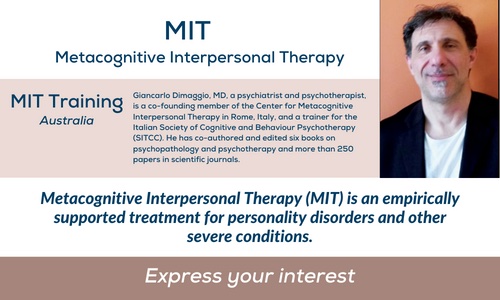MIT Training

- Course Level : Mental Health Professionals
- Duration : TBA
- Certificate : Yes
- Language : English
- Access
Metacognitive Interpersonal Therapy (MIT) is an empirically supported treatment for personality disorders and other severe conditions. It is based on a structured and manualised set of procedures aimed at guiding the clinicians’ therapeutic engagement and treatment from the very first session to the conclusion of treatment.
MIT adopts a series of techniques in order to deal with symptoms, promote awareness of maladaptive interpersonal schemas, change them and promote healthier and richer social functioning. This is delivered within a structured framework.
MIT is unique in that it focuses on an individualized, fine-grained case formulation so to meet the needs of the specific person while still remaining highly formalized.
A major focus of this training will be on assessing and reconstructing maladaptive interpersonal schemas. Procedures are described for how to first enrich the repertoire of clients’ autobiographical memories, which are the basis for understanding maladaptive interpersonal schemas. Once a shared formulation is established, the procedures will focus on how to promote change. The therapy works on promoting metacognitive differentiation or critical distance from maladaptive interpersonal schemas and in parallel to experiential access to the healthy self.
Schemas are more than cognitive representations; they are mostly made of emotionally charged mental images, with powerful somatic correlates. In order to address this component, experiential work is necessary. For this reason, MIT procedures now include techniques such as guided imagery and rescripting, role-play, two-chair work, and sensorimotor exercises. These techniques are delivered according to a case formulation which is fine-tuned, shared with the client and continuously updated.
Throughout therapy, there is a focus on how to prevent and repair ruptures in the therapy relationship and how to meta-communicate, that is, reflect jointly on the therapy relationship in order to both improve clients’ awareness of their own functioning and to create an environment where jointly thinking on mental states of both the participants in the relationship is safe.
About the Presenter:
Giancarlo Dimaggio, MD, a psychiatrist and psychotherapist, is a co-founding member of the Center for Metacognitive Interpersonal Therapy in Rome, Italy, and trainer for the Italian Society of Cognitive and Behaviour Psychotherapy (SITCC). His primary interest is in personality disorders. He has co-authored and edited six books on psychopathology and psychotherapy, and more than 250 papers in scientific journals. Dr Dimaggio is editor-in-chief of the Journal of Clinical Psychology: In-Session, an associate editor of Psychology and Psychotherapy and the Journal of Psychotherapy Integration.
